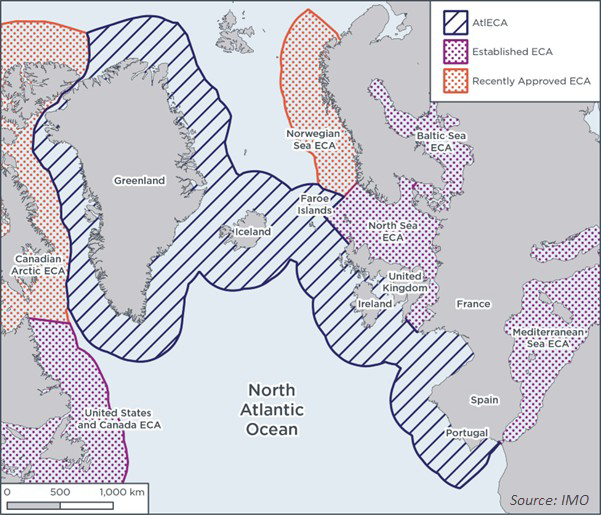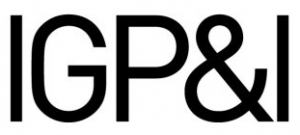
The IMO agrees to designate a new emission control area (ECA) in the North-East Atlantic Ocean, connecting existing ECAs in the Baltic Sea, North Sea, and English Channel ECAs to those recently established in the Mediterranean Sea, Norwegian Sea, and Canadian Arctic waters.
Updated 02 December 2025
Published 24 April 2025
Regulatory changes
At the 83rd session of the IMO’s Marine Environment Protection Committee (MEPC 83) , the MEPC approved a proposal to designate the North-East Atlantic Ocean as an ECA for nitrogen oxides (NOx), sulphur oxides (SOx) and particulate matter (PM) emissions, amending MARPOL Annex VI Regulations 13 and 14 accordingly.
ECA description
The North-East Atlantic Ocean ECA encompasses the exclusive economic zones (EEZ) and territorial seas, extending up to 200 nautical miles from the baselines of, Greenland, Iceland, the Faroe Islands, Ireland, and the mainland of the United Kingdom, France, Spain, and Portugal. The designation excludes sea areas bounded by any of the existing ECAs, as well as the EEZ maritime areas adjacent to Madeira, the Azores, and Canary archipelagos.

Map of North Atlantic Emission Control Area.
The geographic outer boundaries of the North-East Atlantic Ocean ECA are comprehensively described in IMO Circular Letter No. 5005. The Clean Arctic Alliance has also issued a series of infographics that provide a useful overview of existing and upcoming ECAs designated under MARPOL Annex VI.
Expected timeline
The proposal was originally scheduled for final adoption at the extraordinary MEPC session (MEPC ES.2) in October 2025. However, as member states were unable to reach agreement on the proposed GHG fuel-intensity requirements and the associated pricing and reward mechanism, the meeting was postponed for one year. Consequently, no conclusions were reached, including on the proposed amendments to MARPOL that would designate a new ECA in the North-East Atlantic Ocean.
Due to the delay, there is currently no fixed date for the North‑East Atlantic Ocean ECA to take effect. If the proposal is adopted at MEPC 84 in April 2026, it could enter into force in autumn 2027 - at least 16 months after its adoption - with the 0.10% sulphur limit becoming mandatory in the ECA 12 months later.
The requirement for NOx Tier III engine certification, originally intended to apply to ships contracted on or after 1 January 2027, is also expected to be postponed accordingly.
However, all dates remain subject to change pending formal adoption of the amendments.
Recommendations
Ship operators should take note of the above and make sure their bunkering procurement and onboard operating procedures comply with MARPOL requirements in force at any given time. Now that most European and North American waters will be part of an ECA, it is important to verify that enough fuel with the appropriate sulphur content is available and that proper fuel changeover procedures are in place and implemented before entering an ECA.
Fine particulate matter (PM) is a particular health risks due to its ability to penetrate deep into the lungs and enter the bloodstream. Since removing sulphur from fuel can help reduce PM emissions, many regions, states, and ports around the world have implemented their own strict sulphur emission limits. A round-up of some of these places is included in our article “Regional sulphur emission limits at a glance”. Ship operators must therefore ensure that crew members are familiar with the sulphur emission limits in force, not only in the MARPOL designated ECAs, but in all jurisdictions to which they trade. Crews should also be provided with clear procedures and guidance to this effect. As new local regulations or changes to existing legislation can be implemented with very little notice, and the regulatory enforcement strategy may differ from one region/port to another, ships’ masters should always seek advice from their agents on local requirements well in advance of the ship’s intended port call.
And by the way…
Do not forget that that the Mediterranean Sea ECA for SOx and PM took effect on 1 May 2025. It includes all waters bounded by the coasts of Europe, Africa and Asia, and is described in detail in IMO Resolution MEPC.361(79).
Related Articles

Watch out for new emission control areas




